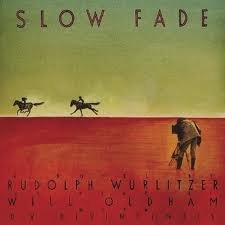| « Bookmarks | You're Invited... » |
Reviews Mon Sep 12 2011
Review: Slow Fade by Rudolph Wurlitzer

Rudolph Wurlitzer, grandson of the founder of Wurlitzer organs, is a regular renaissance man. He wrote the libretto for a Philip Glass opera, a documentary about Tibet, and several novels (Nog, The Drop Edge of Yonder, Hard Travel to Sacred Places). Cinephile households are those in which he's most likely to be a household name, having written several screenplays, including Two-Lane Blacktop and Pat Garrett and Billy the Kid. His 1984 novel Slow Fade was rescued in re-release this past June by the book imprint of local indie record label Drag City, complete with an audio version read by Will Oldham (a.k.a. Bonnie "Prince" Billy).
Slow Fade carries the weight and authenticity of Wurlitzer's Hollywood curriculum vitae. The book's foreword provides some illuminating backstory: in it, director Alex Cox (who directed the "acid Western" film Walker from Wurlitzer's screenplay) mentions Wurlitzer's mixed feelings about Pat Garrett and Billy the Kid (the finished product, anyway). "Rudy wrote Pat Garrett for Monte Hellman to direct, but the studio gave it to Sam Peckinpah, the Western guy, instead. He gutted the script, turning it from a lonesome, existential tale whose heroes didn't meet until the very end into a story of old buddies who betray each other's code. The screenwriter didn't necessarily appreciate the process, but what the director was doing was transforming Wurlitzer's script into a Peckinpah film. Almost all of Peckinpah's films, and all his Westerns, were about old friends betraying each other's code, and by God, Pat Garrett and Billy the Kid would be, too."
Slow Fade is the story of fictional director Wesley Hardin, a combative, narcissistic, drug abusing director largely inspired by Peckinpah. Wesley is getting on in years, his personal life is about to collapse under years of neglect and estrangement, and he's in the middle of a film way over budget.
As several reviews I've read have noted, the plot of Slow Fade kind of zigzags all over the place. For starters, we're first led to believe it's the story of A.D. Ballou, a roadie/jack-of-all-trades/entertainment industry freelancer. A.D. unknowingly stumbles onto Wesley's movie set. Wesley winds up owing A.D. a favor, and A.D. smells opportunity in rubbing elbows with the Hollywood elder. To keep him out of his hair, Wesley offers him a gig co-writing a screenplay with his son Walker. Walker seems the stereotypical layabout son of a star, constantly traveling, constantly stoned, never seeming to work a real job. The more you learn about Walker, though, the more you understand the sorrow and unasked-for family drama at a root of his flakiness.
Chief among this drama is the question: where the hell is his sister, Clementine? Last known to be on some kind of spiritual quest in India, Wesley gets friends in high places to look for her. When that proves fruitless, he assigns Walker and A.D. to write a screenplay about where she might be. Many of the novel's pages are the "story within a story" of Wesley's screenplay. The story is a mish-mosh of Wesley's spiritual quest in India (much like Wurlitzer himself undertook in Hard Travel to Sacred Places) and various oblique and direct references to Wesley's bitterness and resentment toward his father.
In addition to his actual children, Wesley seems to serve as a target for the pent-up daddy issues of pretty much everyone in his life. Everyone wants his approval yet burns to tell him to go to hell. For instance, when his movie crew learn their production budget's been pulled, they try to salvage their efforts by making an expose about the director's crumbling personal life, simply by turning the cameras on as he conducts his everyday affairs (the ol' "give your enemy enough rope and he'll hang himself" approach). As his much younger wife simply sums up "...we love and hate and fear you."
All in all, I felt the story's constant shifts in focus and the emotional disconnect the characters feel toward one another prevented me from getting very emotionally invested. For instance, there's a scene where a character sees his wife on the verge of cheating on him with another man. As the scene is introduced it strikes me that I have no idea how the cuckolded character will feel about this (angry? Indifferent? Turned on? Is this an everyday, ho-hum thing in their reality, or what?). Nevertheless, Slow Fade is the work of a seasoned veteran. Its world is "lived in" and chock full of cinematic details, its author grappling with such issues as life with the larger-than-life and the struggle to reconcile Western bombast with Eastern spirituality.









